―
Dismantle the United Nations!
―
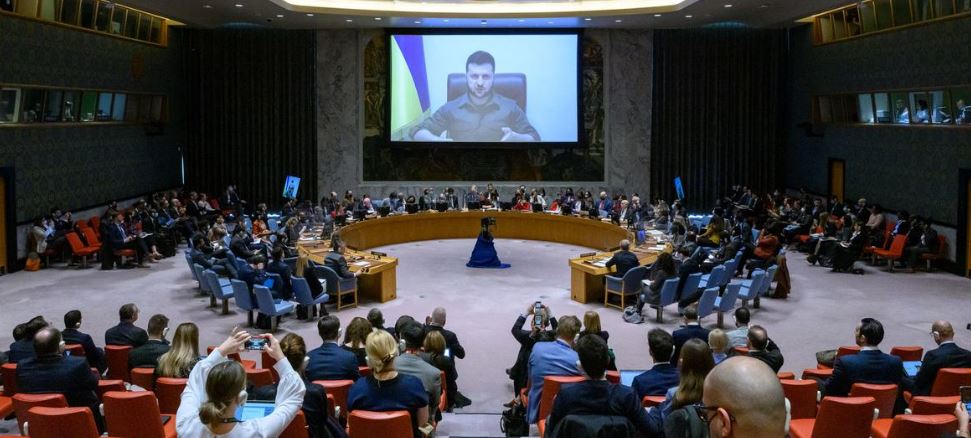
Ukraine President Zelensky addresses UN Security Council online (Source: UN)
“So where is the security that the Security Council must guarantee?”
“Are you ready for the dissolving of the UN? Do you think that the time of international law has passed?
If your answer is no, you need to act now, act immediately."
—Ukrainian President Zelensky in his speech to the UN Security Council—
This is the cry of Ukraine's President Zelensky, addressing the UN Security Council by video on April 5, 2022. President Zelensky released pictures of the gruesome “secondary genocide,” in which at least 300 civilians were cited as having been murdered. The conference hall fell silent, and people watching around the world were outraged.
For the full text of Ukraine President Zelensky's speech to the UN Security Council
https://www.president.gov.ua/en/news/vistup-prezidenta-ukrayini-na-zasidanni-radi-bezpeki-oon-74121
When you hear the word "world peace," an international organization comes to mind. That is the United Nations. However, the presence of the United Nations in this war in Ukraine is not what it used to be. Why is the UN so powerless in the face of blatant war?
To understand the context of this discomfiting situation, it is necessary to examine the UN Charter, which sets out the role of the UN. As you know, the United Nations is an international organization created for international peace after World War II. Chapter 1, Article 1 of the Charter of the United Nations specifies the purpose of the establishment of the United Nations: △ Maintaining international peace and security, △ Repressing acts of aggression and destroying peace, △ Mediating and resolving international disputes.
UN Charter Article 1 The purposes of the United Nations are: 1.To maintain international peace and security, and to that end: to take effective collective measures for the prevention and removal of threats to the peace, and for the suppression of acts of aggression or other breaches of the peace, and to bring about by peaceful means, and in conformity with the principles of justice and international law, adjustment or settlement of international disputes of situations which might lead to a breach of the peace. |
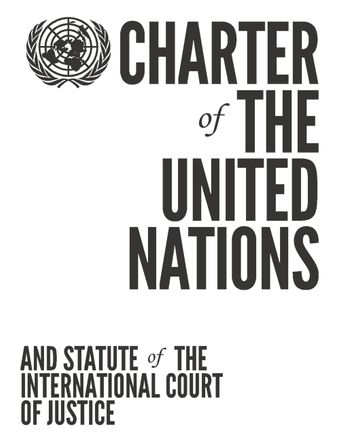
To view the full text of the UN Charter:
Chapter I: Purposes and Principles (Articles 1-2) | United Nations
―
Security Council
The power to mobilize the United Nations
―
The UN was created on Oct. 24, 1945, in the process of maintaining world order before and after World War II. Currently with 193 member states, it is the world's largest international organization both in name and in reality that oversees global governance.
The main organizations of the United Nations include the General Assembly, Security Council, the Economic and Social Council, the Secretariat, and the International Court of Justice. The crux of the dual axis of power is the Security Council.
As the name suggests, the Security Council has the most central mission of the United Nations to maintain world peace and security, which makes the decisions of the Security Council legally binding on its member states.
The UN Secretary-General, who is the head of the UN Secretariat and serves as a representative of the UN, is also decided by the General Assembly based on the Recommendation of the Security Council, and furthermore, from investigations, adjustments, economic sanctions, and diplomatic severance for peacekeeping, to armed forces that mobilize military force if necessary. Intervention is also decided by the Security Council.
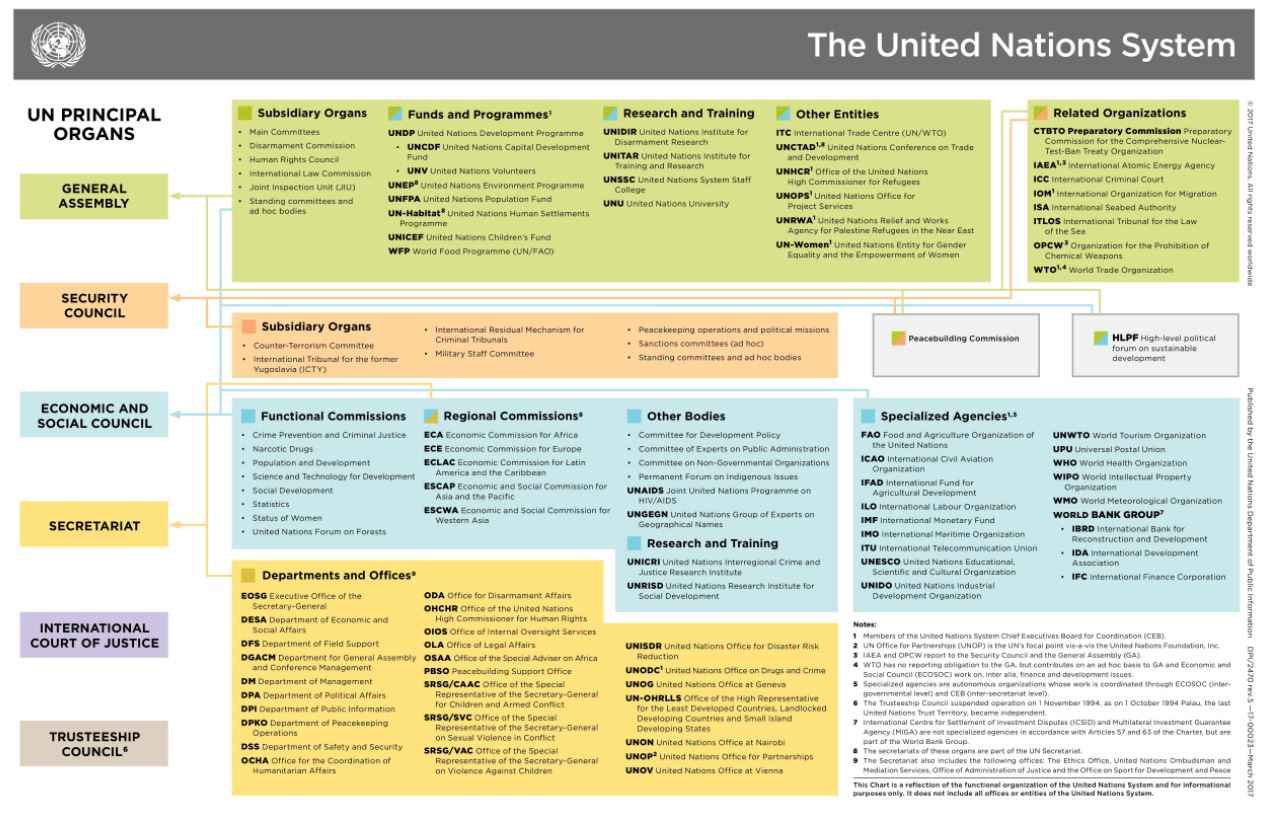
To see detailed information on major UN agencies:
https://www.un.org/en/model-united-nations/un-structure
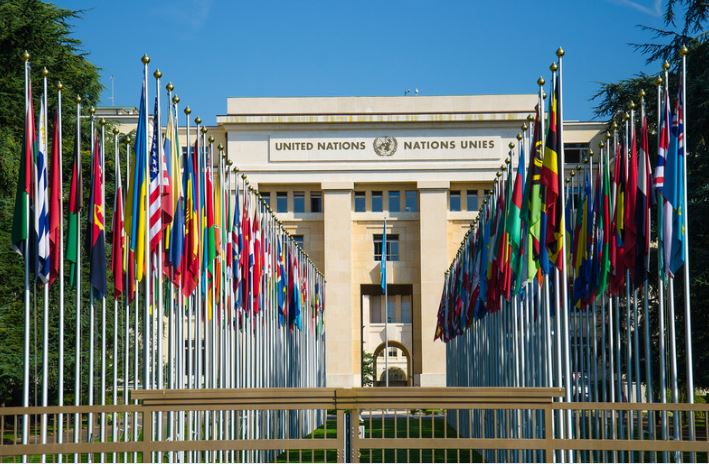
The Security Council consists of 15 member states. Five countries are permanent members, including China (which replaced Taiwan in 1970), France, Soviet Union (succeeded by Russia after the dissolution of the USSR), the United Kingdom, and the USA, the victorious nations of World War II; the remaining 10 countries are non-permanent members.
Non-permanent members are elected at the General Assembly every two years in consideration of their contribution to the United Nations and region.
How long is the term of permanent members? Indefinite: they have permanent tenure.
The UN Charter only stipulates a term of office for non-permanent members. No term of office is specified for permanent members. It means it is endless. Therefore, these five member states on the Security Council are designated as the P5 (Permanent Five).
UN Charter Article 23
1. The Security Council shall consist of fifteen member states of the United Nations. The Republic of China, France, the Soviet Socialist Republics, the United Kingdom of Great Britain and Norther Ireland, and the United States of America shall be permanent members of the Security Council. The General Assembly shall elect ten other Members of the United Nations to be non-permanent members of the Security Council, due regard being specially paid, in the first instance to the contribution of Members of the United Nations to the maintenance of international peace and security and to other purposes of the Organization, and also to equitable geographical distribution. Article 27 point 3. Decisions of the Security Council on all other matters shall be made by an affirmative vote of nine members including the concurring votes of the permanent members. |
▲ Composition and tenure of the Security Council
―
The veto—the source of power of
permanent Security Council members
―
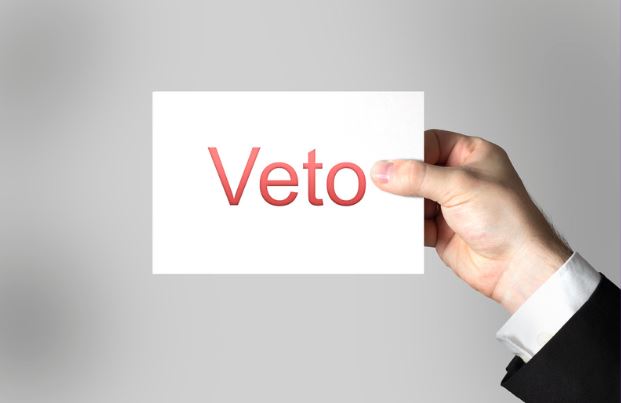
Decision-making of the Security Council is decided by affirmative votes of the nine members 'including affirmative votes by the permanent members.' This regulation contains a frightening imbalance of power. It means that even if 14 of the 15 Security Council members vote in favor, an agenda will be rejected if any of the 5 permanent members votes against it. This is what is called a veto.
The veto is the biggest source of power for permanent members. Criticism pouring into the Security Council is focused on this veto. It is because there are many cases where the exercise of the veto by the permanent members was based on the ‘interest of their own country’ rather than ‘the peace of the community.’
Since 1946, a total of 295 vetoes have been exercised in the UN Security Council, including by Russia (including the former USSR) 143 times, by the United States 86 times, by the United Kingdom 30 times, and by France and China 18 times each.
Russia is clearly No. 1. Russia has vetoed 15 sanctions against Syria owing to Syria's pro-Russian stance. It was an abuse of authority based on national interests, far from world peace.
What about the US, the second-largest wielder of the veto? The USA repeatedly used its veto in favor of Israel over issues related to the Israeli-Palestinian conflict. Again, these decisions were far from world peace.
The use of veto powers by Britain, France and China has been no different.
Consult a roster of past Security Council vetoes:
https://research.un.org/en/docs/sc/quick
(UN data link)
◆ Examples of vetoes cast by permanent members of the Security Council
◇ In February 2012, after the Syrian government's crackdown on civil protesters killed more than 5,000 citizens, the Security Council voted on a resolution calling for an end to the bloody suppression and a peaceful transfer of power. China vetoed it and the passage was overturned.
◇ In 2017, 14 of the 15 members of the Security Council voted in favor of a resolution to nullify the declaration by then U.S. President Donald Trump recognizing Jerusalem as the capital of Israel, but it was vetoed by the United States.
◇ In April 2018, the Security Council resolution calling for a full investigation into Syria's chemical weapons in connection with allegations that the pro-Russian government was using chemical weapons in rebel areas was rejected by Russian opposition.
◇ In May 2021, the military used chemical weapons on civilians in Myanmar, killing large numbers. In response, the Security Council held a meeting to decide if the UN should intervene in the Myanmar incident, but no action was taken due to opposition by China and Russia, who support the Myanmar military.
―
Reform the Security Council! Dismantle it!
―
“It is not in my power to reform the UN Security Council. I have no illusions of immediate reform.
But I would state that the United Nations as a whole, not the Security Council, is truly doing its best to support the Ukraine.”
—Guterres, Secretary-General of the United Nations, April 28, 2022—
During his visit to Kyiv, the capital of Ukraine
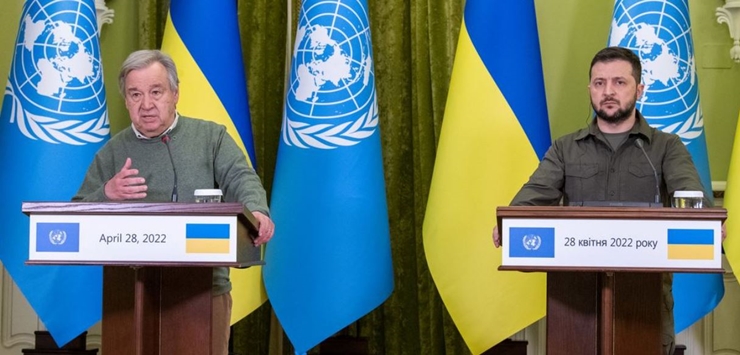
UN Secretary-General visits Ukraine
(Source of left-hand photo: UN)
"Where in the world is the UN and what is it doing?!" Reporters showered criticism on UN Secretary-General Guterres, who visited Kyiv. Guterres retorted that it was not in his power to reform the Security Council.
Even the head of the United Nations—the president of the world—acknowledges that the P5's veto power is 'sacrosanct' and that he is helpless in front of it. This scene highlights the reality that the Secretary-General and General Assembly of the United Nations are powerless in front of the mighty power of the Security Council.
The reality of the UN is that, though established to ensure global safety, the P5 trample on others to ensure their own safety first and superintend their national interests. So now thoughts of Security Council reform and the dissolution of the Security Council are emerging.
Criticism of the Security Council is fueled by Russia's invasion of Ukraine. The U.N. held an emergency meeting of the Security Council on February 25, the day after the invasion of Ukraine. A resolution condemning the Russian invasion of Ukraine and calling for the withdrawal of troops was put on the agenda of the emergency meeting of the Security Council, but it was canceled by Russia's veto, a party to the war.
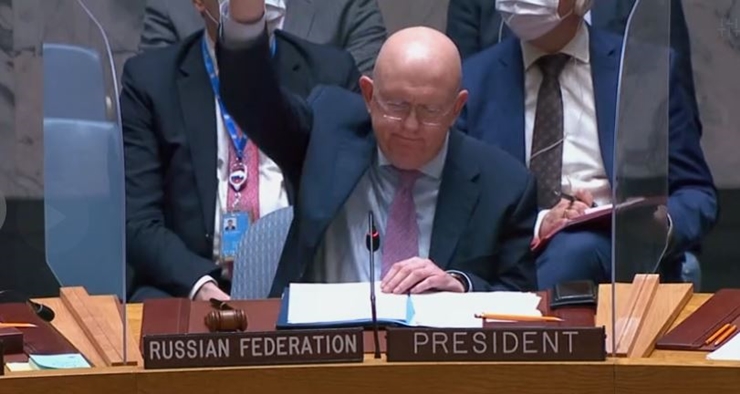
Russian delegate speaking at the Security Council on the issue of Russia's invasion of Ukraine on February 25 (Source: AP)
―
Is reform impossible?
―
If so, is there any way to limit the exercise of the veto by the permanent members? We can't say there isn't, but it doesn't look like it's going to be easy. The only way would be to amend the UN Charter, which stipulates the tenure and veto rights of the permanent members. Article 108 of the U.N. Charter specifies the terms for revising the Charter.
This part makes the heart ache. Namely, to amend the UN Charter, the consent of all permanent members of the Security Council is required. The permanent members who led the creation of the United Nations in the first place have been pegging their authority and status right from its inception.
UN Charter Article 108 Amendments to the present Charter shall come into force for all Members of the United Nations when they have been adopted by a vote of two-thirds of the members of the General Assembly and ratified in accordance with their respective constitutional processes by two-thirds of the Members of the United Nations, including all permanent members of the Security Council. |
In fact, it's not that there has been no movement for reform of the Security Council. One of such reforms is that the number of non-permanent members increased from six at the time the UN was established to ten in 1965.
Some nations wish to expand the permanent membership. Germany, Brazil, India, and Japan constitute the G4. These G4s want and call for the addition of six nations, including the G4 nations plus two African countries, as permanent members. They propose that the number of non-permanent members be increased by four more and that the new permanent members may not exercise the veto for 15 years.
The 'Uniting for Consensus' group, led by South Korea, Argentina, Canada, Italy, and Pakistan, which are competing with the G4, oppose the expansion of permanent members and propose instead an additional increase of 10 non-permanent members.
Lately at the UN General Assembly there has been a movement to limit the powers of the Security Council. On April 26, the UN General Assembly passed a resolution limiting the abuse of the right of veto by permanent members of the Security Council.
When a permanent member of the Security Council exercises its veto, a general meeting must be held within 10 days to discuss the situation in which the veto was wielded. It is to lead the delegates to reconsider the exercise of the veto through public debate. But it remains to be seen whether this can be enacted, as Russia and China are likely to oppose this as well. The catch is that it is not binding if the vetoing state refuses to explain its position in the discussion.
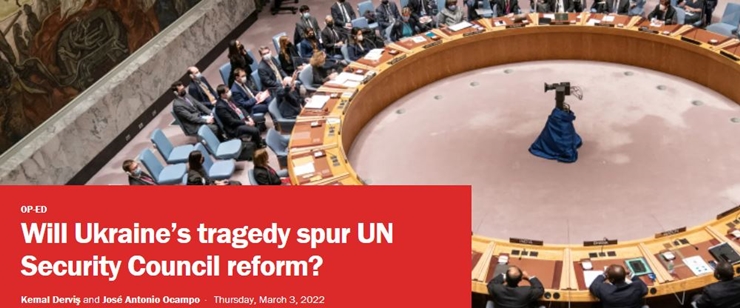
Recently, the Brookings Institute, which deals with international strategic issues, published an article titled, “Will Ukraine’s Tragedy Spur the Reform of the Security Council?” The Institute lambasted the Ukrainian war as highlighting the veto of the permanent members of the Security Council an obstacle to peace.
It also noted that it is “unfortunate” for an “ineffective” Security Council to be at the axis of multilateralism in the face of increasing new threats such as cyberattacks, bioterrorism and climate change.
The Brookings Institution proposes to amend the UN Charter so that the veto power of the permanent members can be nullified with the consent of more than two-thirds of the member states and more than two-thirds of the population as an alternative to solving the power imbalance in the permanent members.
https://www.brookings.edu/opinions/will-ukraines-tragedy-spur-un-security-council-reform/
―
Is Peace Merely a Utopian Fantasy?
―

As I chew the cud of a helpless UN in front of Russia's invasion of Ukraine these last few months, I grow hopeless, relegating world peace to something forever beyond reach.
Is peace inevitably helpless before the privilege of the great powers? Is peace merely a utopian fantasy, existing only in our imagination?
I would like to close this article with a speech by Ukrainian President Zelensky to the UN Security Council:
“It is now clear that the goals set in San Francisco in 1945 during the creation of a global international security organization have not yet been achieved. And it is impossible to achieve them without reforms.
Therefore, we must do everything in our power to pass on to the next generations an effective UN with the ability to respond preventively to security challenges and thus guarantee peace.
Prevent aggression and force aggressors to peace. Have the determination and ability to punish if the principles of peace are violated.
There can be no more exceptions and privileges.
Everyone must be equal.
All participants in international relations. Regardless of economic strength, geographical area and individual ambitions.”
— Ukrainian President Zelensky addresses the UN Security Council —
Written by Sharon Choi
Director of Planning
Sunhak Peace Prize Secretariat

